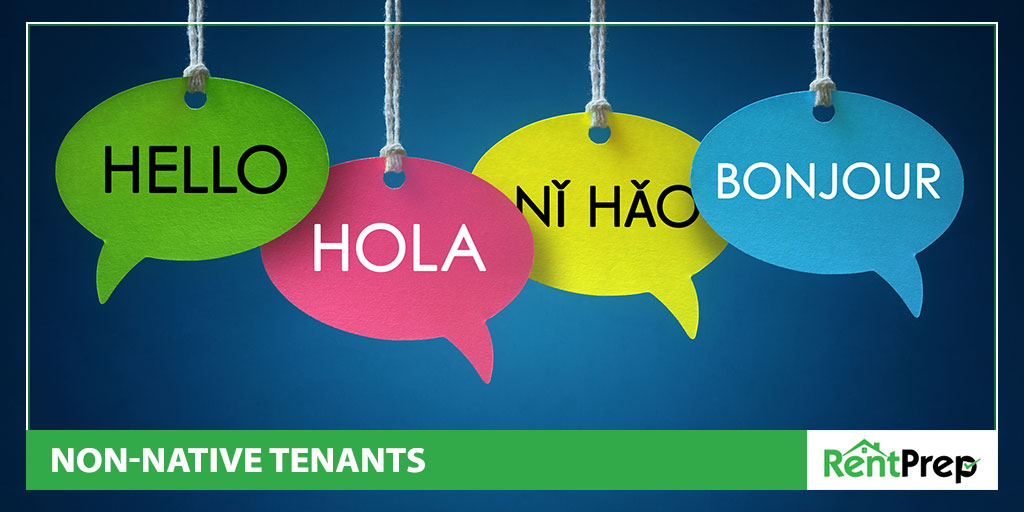
One of the most important things that you need to be able to do as a landlord is to find and secure great tenants for your properties. Another important task is to communicate thoroughly and effectively with your tenants so that you have a good relationship.
When your tenant cannot speak English fluently or at all, however, it can seem impossible to accomplish those goals.
Landlords confronted with this situation may wonder how to rent to tenants that speak another language than my own. If a potential tenant can’t understand the lease, how can they agree to its terms?
There’s no doubt that this is a situation that should be handled carefully, but it isn’t impossible to navigate. With the right tips in mind, you can rent to a tenant despite the language barrier. They may even end up being some of your favorite tenants ever!
A Table Of Contents For Tenant Language Barriers
- Tip #1: Family Members
- Tip #2: Translators And Support
- Tip #3: Language Apps
- Tip #4: Written Communication
- Tip #5: Stick To Your Rules
- Fair Housing Laws
Tip #1: Family Members
Most potential tenants that are not fluent in English are well-aware of how this might affect their renting ability. Some may write, “I don’t speak any English,” on their rental application. Usually, that won’t be the only thing that they write.
Tenants that aren’t fluent in English are likely to enlist help from a family member or friend to make the rental arrangements happen, and it’s okay for them to do this. For them, this is a reliable person in their life that they can trust to give them accurate information. For you, this makes the whole process easier.
If a potential tenant doesn’t speak much or any English, ask them if they have someone that can help translate for them. In many cases, they will be able to set up calls or meetings with a third-party so that you can all get on the same page.
Tip #2: Translators And Support

Another way that you can handle this situation is through interpreters and support systems that exist for non-English speakers in America.
Some potential tenants will be open to the idea of hiring an interpreter to help with the documentation and communication, though this won’t be possible for everyone. If the property is a high-profit one, you may even consider hiring an hourly interpreter yourself when needed. Consider if this will affect your profits and/or if it will pay off in the end.
Additionally, it’s a good idea to become familiar with what resources are available for non-English speakers. In some areas, there are government, non-profit, or immigrant-focused organizations that provide free or discounted translation for housing situations.
Keep a list of these types of organizations, and then provide this list to any tenants that indicate they have some trouble with English or whatever language you are operating in.
Tip #3: Language Apps
If your potential tenant can speak some English but is not completely fluent, you might be able to get by using translation apps like Google Translate or iTranslate.
These apps are not, by any means, perfect, but they can help to bridge the gap in communication. Most landlords find that these apps are perfect for using to communicate with your tenants after they’ve moved in. You can text each other in your native language, and then use the app to translate.
While communicating in person, there are even some apps that will read sentences out loud for you. Technology in the language field is amazing, so you can give these types of services a try.
Tip #4: Written Communication
One of the most important things to do when figuring out how to rent to tenants that speak another language than my own is to stick to written communication as much as possible.
Written communication can easily be translated by a friend that speaks the language, sent to a translating service, or put through a translating app to give you an idea of what is being said. Spoken communication will be impossible to type up and get translated on the fly, and you’re likely to miss important details.
Written communication can also be easily referenced from time-to-time when you need to clarify any agreed-upon terms or check what the tenant was asking you last month. When you have a record on file, keeping up good communication practices despite the language barrier becomes much easier.
Tip #5: Stick To Your Rules
Finally, we want to address the fear that some landlords have about renting to tenants that don’t speak their native language very well. It’s been expressed that landlords have a few fears of being trapped by these tenants or that these tenants will be “legally allowed” to break the lease agreement because they didn’t understand it.
A lease agreement is a legally binding document, whether the tenant can fully read it on their own or not. If they break the lease, that can be acted upon as it would be with any other tenant.
This is why it is especially important to make sure that the tenant has a translator with them when they are going over and signing the lease agreement. If you work with many non-native English speakers and want to continue to have great communication with them, you could also get some essential guidelines and bullet points from the lease extracted and translated.
While the binding document that you file with the courts needs to be in an official language, it’s OK to give your tenants some translated material as well.
Fair Housing Laws
There is some back-and-forth in the landlord community about whether or not it is legal to deny an application because the tenant doesn’t speak English very well or fluently. While Fair Housing Act laws do not specifically address language problems, they do state that applicants may not be discriminated against for their national origin.
It is difficult to say if, by extension, those same laws could be applied to language-based problems. The Federal Housing Association recommends that language be considered an extension of national origin.
With these things, it is always better to err on the side of caution. Rejecting a potential tenant simply because they do not speak English fluently probably isn’t in your best interests unless they have other red flags.
Focus Beyond Language

Many potential renters that do not speak English well are going to work extra hard to make sure that they are great tenants; most will also provide their own translator because they want to have a better shot at getting the lease agreement in place.
Figuring out how to rent to tenants that speak another language than my own does not have to be difficult if you keep your key resources in mind:
- Family members/friends that are bilingual
- Translators
- Translation apps
- Local support organizations
By utilizing the tools available to you and your tenant, you can create a fruitful relationship. Don’t use language as the deciding factor of whether to rent to a tenant or not; focus on what else they bring to their application.

